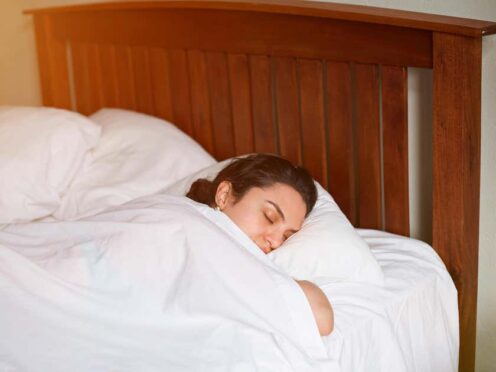
Getting a good night’s sleep can cut the risk of irritable bowel syndrome (IBS), researchers have found.
A healthy lifestyle, including getting enough exercise, may also help prevent the condition developing, they suggested.
IBS affects the digestive system and symptoms include stomach cramps, bloating, diarrhoea and constipation.
People can suffer for days, weeks or months at a time, though symptoms can come and go over time.
It is not known exactly what causes IBS, but past research has suggested oversensitive nerves in the gut, stress and a family history of IBS can play a role.
The new study, published in the journal Gut, found that leading a healthy lifestyle was strongly linked to a lower chance of developing the condition.
Among several factors, not smoking, having plenty of vigorous exercise and getting at least seven hours of sleep a night seemed to have the biggest effect.
For the study, experts looked at 64,286 people (average age 55, just over half of whom were women) from the UK Biobank medical database.
None of those in the study had a diagnosis of IBS at the start, and all had completed at least two 24-hour questionnaires on their diets.
Five healthy behaviours – not smoking, good sleep, enough exercise, healthy diet and lower alcohol consumption – were all looked at.
Over a period of 12.5 years, 961 (1.5%) cases of IBS were noted.
Of all those in the study, 7,604 (12%) people did not have any of the five healthy lifestyle behaviours, while 20,662 (32%) reported one, 21,901 (34%) reported two, and 14,101 (22%) reported three to five.
After accounting for factors that could influence the results, such as family history of IBS, people who were healthiest had the lowest risk of IBS.
One healthy behaviour was associated with a 21% lower risk, two were associated with a 36% lower risk, and three to five were linked to a 42% lower risk.
Individually, never smoking was linked to a 14% lower risk, a high level of physical activity led to a 17% lower risk, and a good night’s sleep led to a 27% lower risk.
The researchers, from the University of Hong Kong, could not prove cause and effect due to the nature of the study.
But they concluded: “Adhering to a higher number of the five healthy lifestyle behaviours is significantly associated with a lower IBS incidence in a middle-aged population.
“Our findings suggest the potential of lifestyle modifications as a primary prevention strategy for IBS.”

Enjoy the convenience of having The Sunday Post delivered as a digital ePaper straight to your smartphone, tablet or computer.
Subscribe for only £5.49 a month and enjoy all the benefits of the printed paper as a digital replica.
Subscribe